“Three or four wenches, where I stood, cried ‘Alas, good soul!’ and forgave him with all their hearts: but there’s no heed to be taken of them; if Caesar had stabbed their mothers, they would have done no less.” – Casca, Julius Caesar, Act I, Scene II
“I could stand in the middle of 5th Avenue and shoot somebody and wouldn’t lose any voters, ok? It’s, like, incredible.” – Donald Trump, January 23, 2016
~~~
There’s a man in office who seems like he won’t be satisfied until he’s a king. His narcissism is so boundless that flattery, no matter how outrageously unbelievable, can cause him to change policies or reverse course on decisions he has already announced. He has allies whose shouting voices sway the opinion of an easily-manipulated populace. He has supporters who would declare him dictator perpetuo – dictator in perpetuity – so he might govern for life. He’s been thrice married and often talks about himself in the third person.
And many argue that his rule signals the beginning of the fall of a republic.
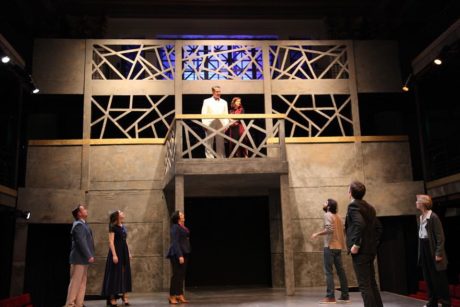
Sound familiar? It should. Even compared to the factionalism, civil wars, and strife of his time, the reign of Julius Caesar – over 2,000 years ago – suffered such intense intrigue, betrayal, and scandal that William Shakespeare was motivated to pen a play about it. And, four hundred years after that, we’re still interested enough in the story that at practically any given time, somewhere in the world, The Tragedy of Julius Caesar is being produced and audiences are coming to watch. In fact, it’s happening right now here in Baltimore; to open its 15th season, Chesapeake Shakespeare Company (CSC) is mounting The Bard’s Julius Caesar – and it’s something you’re going to want to see.
It’s become common lately for directors to explicitly equate Julius Caesar with Donald Trump. You may recall the kerfuffle this summer when the Caesar in Public Theatre’s Shakespeare in the Park was a DJT look-alike wearing a suit and a too-long red tie. When he was brutally murdered by his senators – as always happens – there were protests and much actual drama ensued. It’s an understandable directorial choice; you want your work to make an impact and there are similarities between the men.
There are also, of course, differences. Caesar served in the military. He was, in fact, a gifted tactician, celebrated by many as not only a war hero, but one of the greatest military leaders of all time. Though born to a patrician, historically aristocratic family, prior to coming to power Caesar did not enjoy great wealth and wielded little of the political power that affluence brings. He was an exceptional orator; one might even say he had all the best words.
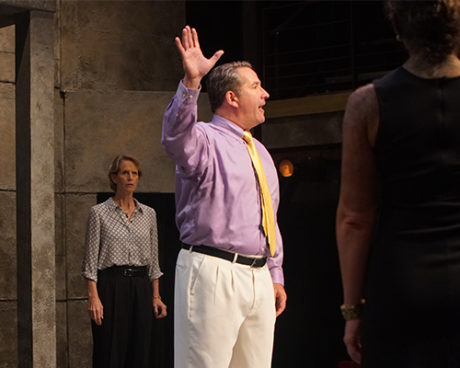
What Director Michael Tolaydo, himself an acclaimed Shakespearean actor, recognizes in his thoughtful handling of this show, is that Caesar is not just one thing. And that the play is open to interpretation. By writing the characters as he did, Shakespeare created a piece of art that has been successfully produced from the perspective of both Caesar as menace and Caesar as martyr. We should recall that there is an entire half of the play left after Caesar’s death – and things don’t just get all better for everyone as result of the murder.
Tolaydo explains. “The play is not really about Caesar or any particular leader. It is about trying to protect the Republic and the voices of the Roman citizens.” With that in mind, Tolaydo instructed the production designers to refrain from any obvious nods toward recognizable heads of state or political ideologies. He wanted to present Shakespeare’s words and “[l]et the audience decide for themselves.”
Despite being named after the titular despot, Julius Caesar centers around Caesar’s lethal frenemy, Marcus Brutus. CSC Resident Company Member Ron Heneghan gives a powerful performance in this crucial role. A troubled patriot, Brutus feared that his friend Caesar – who was literally being deified by supporters – was becoming too powerful and bring tyranny to Rome. In a subtle, nuanced performance, Heneghan beautifully communicates Brutus’s ambivalent inner struggle. His heartsickness over the violence he takes part in is clear when he declares that it was “[n]ot that I loved Caesar less, but that I loved Rome more.”
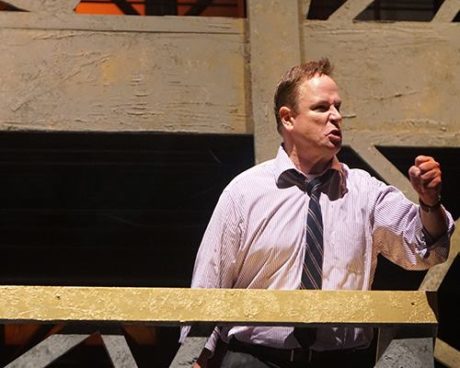
Company Member Michael P. Sullivan’s Julius Caesar is suitably ambiguous for Director Tolaydo’s figure-it-out-yourself rendition of this play. Sullivan effectively portrays Caesar neither as villain nor hero, faithful to the way the character is written. Expressing not only Caesar’s ambition, but also his concern for Rome, Sullivan’s is one of the most human portrayals of Caesar you’re likely to see during the current administration.
Giving an explosive, passionate performance, Company Member Vince Eisenson is excellent as conspirator Caius Cassius. Having known Caesar since before his various elevations and apotheoses, Cassius just can’t accept his new, god-and-ruler-for-life status. Eisenson delivers Cassius’s monologues with pointedly vitriolic oomph, but doesn’t devolve into pettiness. Though he hungers for personal power, Eisenson Cassius seems as exasperated as envious when he vents to Brutus, “We are just as good as him. What is Caesar that he has grown so great?”
Resident Company Member Séamus Miller performs well in several roles, but he really shines as Decius Brutus, the tricksy conspirator who convinces Caesar to emerge on the Ides of March. Miller’s Decius is so charming that one could actually believe him selling the most ridiculous dream interpretation ever.
Another of Director Tolaydo’s noteworthy decisions was to cast CSC’s Julius Caesar almost equally with men and women (seven women, eight men). In addition to the traditionally female roles – the wives, Portia (Caitlin Carbone) and Calpurnia (CSC Company Member Lesley Malin), women played numerous historically male roles.
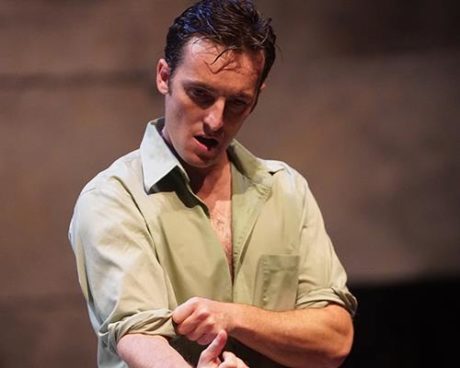
The most significant of these gender-switches was that which converted Caesar’s stalwart right hand man, Marc Antony, into Mar Antonia, captivatingly played by Briana Manente. From the moment Manente whisks onto the stage, all power and professionalism, doubters lose any notion of a “weaker sex.” Clearing a path for The Man Himself, Manente’s Antonia is like a supercharged Kellyanne Conway, only exceptionally well-spoken and badass; thrice offering him the crown, she may be the best PR rep of all time. But when Manente really hits her stride is after Caesar’s death. Her “Brutus is an honorable man” monologue is outstanding, as is her partnership with Octavius-now-Octavia, Caitlin Carbone.
We first meet Carbone as Brutus’s wife Portia. Speaking fluid, comfortable Shakespearean English, Carbone’s Portia is a strong and able partner to the troubled senator. When she implores him to open up about what’s bothering him, she’s no wheedling weakling. She is bold and owns her space in their relationship. As Octavia, Caesar’s heir and a co-leader in the civil war against Brutus and Cassius, Carbone is precise and orderly, as one would expect from a military leader.
Understanding that the existing cast of fifteen is already a lot of people, I do wish that a couple more of the actors were not double-cast. Only Heneghan, Eisenson, and Manente (Brutus, Cassius, and Antonia, respectively) played a single character each; even the eponymous dictator served double-duty as Brutus’s servant Strato. Though both Sullivan and Carbone did great jobs in each of their roles, I found it initially disconcerting to see figures who featured so prominently in the first half appear after intermission as different characters.
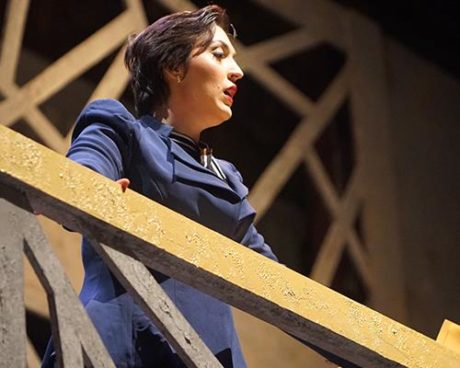
The balance of the talented cast deliver fine performances, as well. Kathryne Daniels, Mary Coy, and Michael Crowley have great comic timing, making the most of Shakespeare’s witty wordplay. Keith Snipes, Mehul Gulati, Lee Conderacci, and Company Members Lesley Malin and Molly Moores ably played an impressive 16 different roles. And Baltimore School for the Arts student Imani Yahshua Turner had excellent stage presence as Brutus’s servant, Lucius – even as he sings and plays the ukulele, lying down.
The technical aspects of the production do not disappoint. Particularly the stone balcony by Scenic Designer Audrey Bodek and the complementary ambient elements by Lighting Designer Michael Lonegro and Sound Designer David Crandall, were on par with any of CSC’s pro-level shows.
Top notch acting and design, coupled with Director Michael Tolaydo’s bold choices in casting and direction, make Chesapeake Shakespeare Company’s production of Julius Caesar a distinctive, enjoyable night at the theater. It portends well for this Baltimore theater’s 15th season. Now get down there and lend them your ears already!
Running Time: Approximately two hours and 30 minutes, with one intermission.
Julius Caesar plays through October 29, 2017 at Chesapeake Shakespeare Company – 7 South Calvert Street, in Baltimore, MD. For tickets, call the box office at (410) 244-8570, or purchase them online.
__
Parking at Arrow Parking, a covered lot on Water Street less than two blocks from the theater, is only $5.00 with a special voucher you can obtain at the theater during the show.





